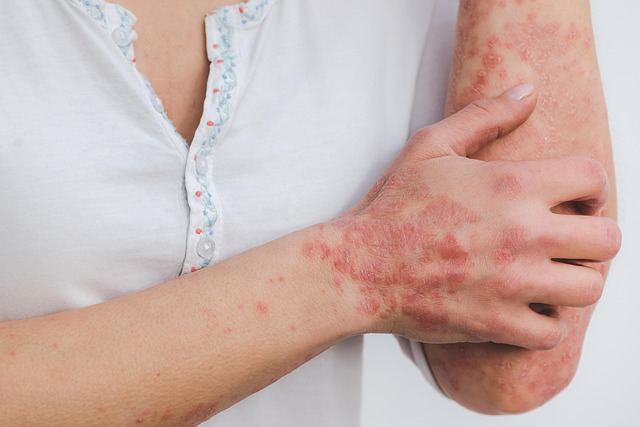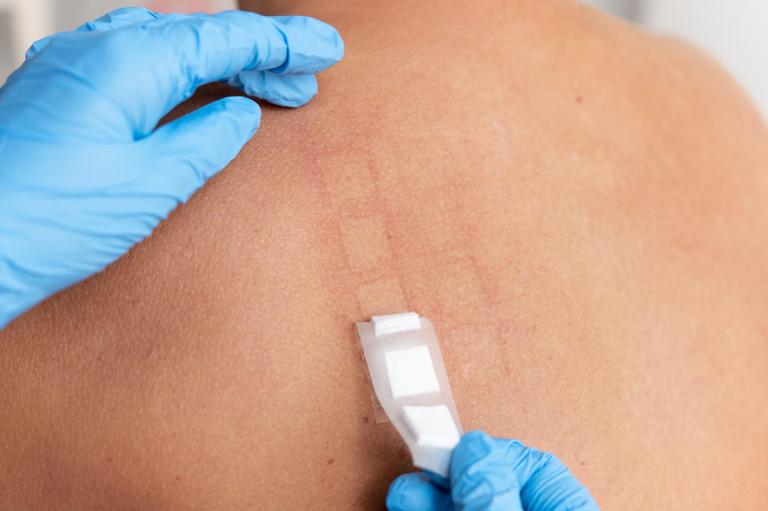Eczema is a common skin condition that causes inflammation, dryness, and itching. It can affect people of all ages and appears in several forms, including atopic eczema. Eczema is a multifactorial condition, often influenced by genetics, environmental triggers, and immune responses.
While there’s no single cure, a range of effective treatments can help manage symptoms and improve skin health.

Triggers of Eczema:
Eczema is influenced by a combination of genetic, environmental, and immune-related factors. Identifying and managing individual triggers is an important part of effective treatment. These include:
-
Dry skin or changes in weather (especially cold, dry air)
-
Irritants such as soaps, detergents, sand and dirt.
-
Airborne allergens such as dust mites, pet dander, grasses, or pollen;
-
Contact allergens including: fragrances, preservatives, nickle, bandaids.
-
Stress or lack of sleep
-
Certain fabrics, such as wool or synthetic materials
-
Food allergies or sensitivities (especially in young children)
-
Skin infections or overgrowth of bacteria (e.g. Staphylococcus aureus).
What can we do for your eczema?
In some cases, eczema has an underlying cause that can be identified through a detailed history, physical examination, or investigations such as patch testing or a skin biopsy. Identifying these triggers can be an important step toward more effective management. Regardless of the cause, we’re here to support you with personalised care—ranging from practical advice and targeted skincare strategies to prescription treatments when needed.
In recent years, significant advances in eczema therapies have offered new hope, even for those with moderate to severe disease. We’re happy to work with you to explore these options and develop a treatment plan tailored to your skin’s specific needs.

FAQ’S
Frequently Asked Questions


Are there different types of eczema?
Yes, eczema as an umbrella term for a type of inflammation which can have various different causes. These include:
-
Atopic Dermatitis
The most common form of eczema, often starting in childhood. It’s linked to allergies, asthma, and hay fever, and is usually chronic and itchy, often flaring periodically. -
Contact Dermatitis
Caused by direct contact with irritants or allergens. It can be:-
Irritant contact dermatitis (non-allergic eg soap, detergents)
-
Allergic contact dermatitis (immune-mediated eg fragrances, preservatives, nickle)
-
-
Vesicular Eczema
Characterised by small, intensely itchy blisters on the hands and feet. It can be triggered by stress, allergens, or moist environments. -
Discoid Eczema
Presents as round, coin-shaped patches of irritated skin, often on the arms or legs. It can be very itchy and is usually triggered by dry skin or skin injuries. -
Seborrhoeic Dermatitis
Affects oily areas like the scalp, face, and chest. It’s thought to be related to yeast on the skin and is known for causing dandruff in adults or cradle cap in infants. -
Venous Dermatitis
Occurs in the lower legs due to poor circulation, often in people with varicose veins or chronic venous insufficiency. It may cause swelling, redness, and skin breakdown.
Are topical steroids safe to use?
Topical steroids are a common and effective treatment for eczema flare-ups. When used as directed—usually in short courses or on an intermittent basis—they are generally safe and well tolerated. Long-term or incorrect use, however, can lead to side effects such as thinning of the skin or reduced effectiveness. It’s important to follow your healthcare provider’s guidance and use the correct strength and duration for your skin.
Does diet affect my eczema?
Diet may play a role in eczema for some individuals, especially in children with food allergies. However, for most people, common food triggers like dairy, eggs, or gluten do not cause eczema but may worsen it during flare-ups. If you suspect a link between your diet and your eczema, speak to your doctor or a dietitian before making any major changes, as unnecessary restrictions can affect nutrition and overall health.
Can stress make eczema worse?
Yes, stress is a well-known trigger for eczema flare-ups. While stress doesn’t cause eczema directly, it can weaken the skin barrier and immune response, making symptoms worse. Managing stress through activities like exercise, mindfulness, or relaxation techniques can be a helpful part of an overall eczema management plan.





